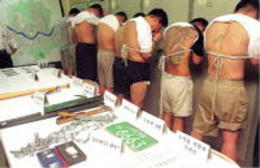 |
Though glamorized by media, average gang member rakes in $13-38k yearly
More than half of South Korea’s criminal rings are doing business overseas, according to a recent report. The Korean Institute of Criminology (KIS) on January 29 released reports on violent criminals’ realms of activity, income, age, and individuals’ position within each organization. The reports surveyed 109 gang members currently in prison. According to the KIS reports, criminal gangs’ main work area encompasses entertainment business trappings such as adult-aimed video gaming and gaming parlors, as well as clubs and bars running prostitution businesses on the side. Gangs are also very actively involved in construction and real-estate development, as well, the study said. The more long-lived and larger the criminal gang, the more involved in the construction business, it said. Up to 63.4 percent of Korea’s criminal gangs are doing business overseas, mostly in Southeast Asia (34.9 percent), China (23.0 percent), and Japan (16.5 percent), the report stated. About 30 percent of Korea’s criminal rings earn roughly between 100-500 million won (US$110,000-530,000) every year through their main businesses. Criminal rings that earned above 1 billion won yearly comprised 19.9 percent of the total. According to the reports, about half of the crime rings have between 50 and 100 members, and less than 27.5 percent have fewer than 50 members. An overwhelming 69.2 percent of chiefs of the criminal organizations are in their 40s, followed by 21.5 percent in their 50s and 8.4 percent in their 30s. About 30 percent of gang members make between 1-3 million won per month, and 22.5 percent between 5-10 million won, the institute’s findings said.Regarding the reasons why those criminal organizations have not been eradicated in South Korea, the researchers cited victims’ and witnesses’ refusal to make statements, light punishment meted out by courts, and lackluster investigatory prowess by the authorities responsible, among other factors. In addition, many citizens have a distorted image of criminal activity because of its glorification through films or TV dramas, the study noted. Dr. Park Gyeong-rae, in charge of the report, said that "even if these surveys are limited due to the respondants’ possible hyberbole of their own group’s prowess and earnings, they are significant because they represent an analysis of criminal economic activities based on a fact-finding methodology." Please direct questions or comments to [englishhani@hani.co.kr]





